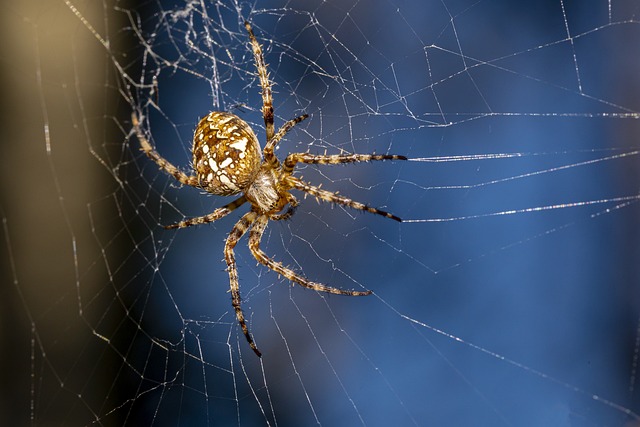To prevent spiders in homes, identify and seal entry points, maintain a clean environment, and employ dual seasonal/continuous methods like sealing during active seasons and indoor treatments in fall/winter. Despite DIY efforts, persistent problems may require professional pest control services specializing in residential spider prevention using eco-friendly treatments. Natural repellents (citronella, peppermint) and plant-based barriers (lavender, catnip) are effective, along with regular vacuuming, fixing leaks, and sealing entry points to deter spiders.
“In the quest for year-round comfort, understanding and implementing effective residential spider prevention strategies is paramount. Spiders, though often misunderstood, are an integral part of our ecosystem. This article guides homeowners through a comprehensive approach to seasonal spider prevention programs, offering insights into common entry points, behavioral patterns, and tailored strategies for each season. We’ll explore both professional services for advanced management and DIY tips leveraging natural repellents and home maintenance practices.”
Understanding Residential Spider Prevention: Common Entry Points and Behavior
Understanding Residential Spider Prevention begins with recognizing common entry points and spider behavior. Spiders are skilled at finding their way into homes through various openings, including cracks in foundations, gaps around windows and doors, and even small holes in screens. They are drawn to dark, secluded spaces and are often seeking food or a mate. Once inside, spiders establish webs in corners, behind furniture, and in hard-to-reach areas, acting as both predators and prey for other pests. Effective residential spider prevention involves sealing these entry points year-round, using professional pest control services when necessary, and maintaining a clean and clutter-free living environment to minimize hiding spots and food sources.
Year-Round Strategies: Seasonal Approaches for Effective Spider Control
In the pursuit of year-round spider prevention, a combination of both seasonal and consistent strategies is key. Residential spider prevention isn’t just about addressing occasional intrusions; it’s a proactive approach to maintaining a comfortable living environment free from these eight-legged visitors. During spring and summer, when spiders are most active, regular outdoor inspections and sealing of entry points can significantly deter their entry.
Fall and winter offer opportunities for different tactics. Indoor treatments with residual pesticides can provide lasting protection, while seasonal changes encourage the use of natural repellents like citrus scents or lavender. Regular vacuuming and cleaning also play a crucial role in removing webs and eggs, disrupting spider life cycles. This dual approach—a mix of seasonal practices and year-round maintenance—ensures effective spider control tailored to each season’s unique challenges.
Professional Services: When to Call Experts for Comprehensive Spider Management
Many homeowners attempt do-it-yourself methods for spider control, but seasonal spider prevention programs offer a more comprehensive and effective approach to managing these pesky arachnids year-round. If you notice a persistent spider problem, despite your best efforts, it’s time to call in the experts. Professional services specialize in residential spider prevention, providing tailored solutions for each unique situation.
Pest control professionals are equipped with the knowledge and tools to identify various spider species, understand their behaviors, and implement targeted strategies. They can assess your property, locate entry points, and deploy safe, eco-friendly treatments to eliminate existing spiders and prevent future infestations. By partnering with experts in residential spider prevention, you ensure a secure and bug-free home environment throughout all seasons.
DIY Tips: Natural Repellents and Home Maintenance for Spider Prevention
DIY Tips: Natural Repellents and Home Maintenance for Spider Prevention
One effective approach to residential spider prevention is adopting simple DIY strategies that utilize natural repellents. Essential oils like citronella, peppermint, and tea tree oil are known to deter spiders due to their strong scents. Mixing a few drops of these essential oils with water and spraying the solution around windows, doors, and baseboards can create a protective barrier. Additionally, keeping your home clean and well-maintained is crucial. Regularly vacuuming, especially in corners and under furniture, helps remove spider webs and eggs. Promptly fixing any leaks or moisture issues, as spiders are attracted to humid areas, further discourages their presence.
Another natural method involves using plant-based repellents like lavender, lemongrass, or catnip, which have been shown to repel spiders naturally. Planting these herbs around your home’s perimeter can act as a barrier. Additionally, sealing entry points and ensuring proper ventilation reduces the likelihood of spiders finding their way inside. Regular inspections and prompt removal of any observed spiders are key steps in preventing infestations.
Implementing a comprehensive residential spider prevention strategy is key to maintaining a pest-free home throughout the year. By understanding common entry points, adopting seasonal approaches, and utilizing natural repellents alongside professional services when needed, homeowners can effectively manage and prevent spider infestations. Combining proactive measures with knowledge of spider behavior equips folks with the tools to foster a spider-free environment, ensuring peace of mind in their living spaces.
